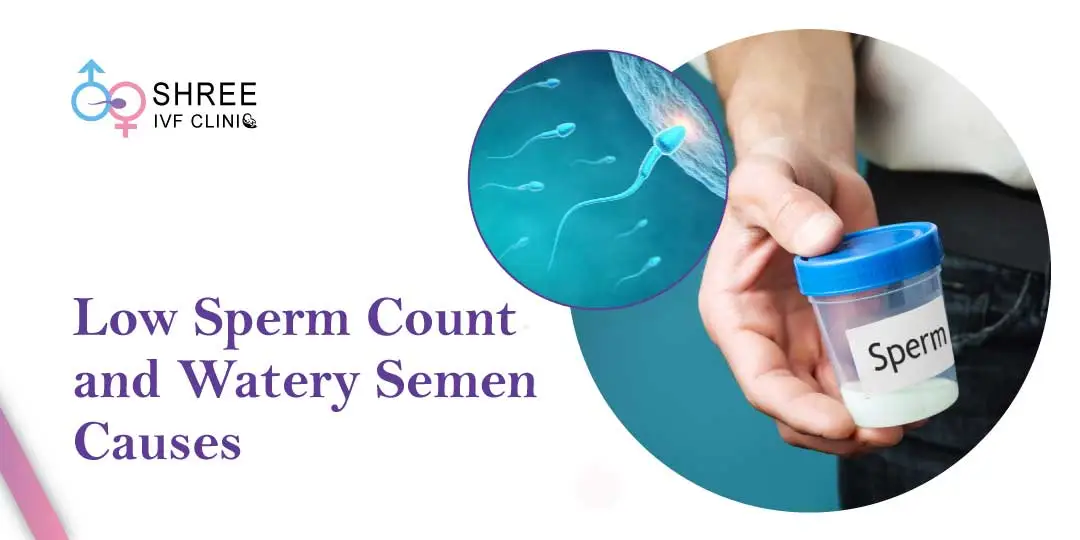Watery sperm can raise questions for many. It refers to a consistency that may seem different from what is typical.
Understanding the characteristics of sperm is important for reproductive health. The appearance and texture can vary based on various factors. Hydration, diet, and overall health play significant roles. Watery sperm can sometimes indicate an underlying issue, but it is not always a cause for concern.
Many men experience changes in sperm consistency at different times. This blog will explore what watery sperm means, possible causes, and when to seek help. By understanding these factors, men can gain insight into their reproductive health and make informed decisions. Let’s dive deeper into this topic to clarify what watery sperm really signifies.

you can check: Fertility Calculator / BMI Calculator / BMR Calculator / Health Risks Calculator
Read More: Ashwagandha Can Make You Horny / Vaginal Pump / Omron Blood Pressure / Vitamin C in Daily / vitamin D deficiency / magic wash laundromat / amphound / pixelxoom / cake ideas
Read More: vaginal depth / Vaginal Pump / Vaginal Cuff / Vaginal Dryness / Tighten Your Vagina / Sore Penis After Sex / Nicotine and Your Sex Drive / Why am I so horny? / Sexual Battery
Read more: 8 oz Chicken Breast / Sea Moss Gel / V8 Energy Drinks / 3 eggs calories / Eating Masago
What Is Watery Sperm?
Watery sperm refers to semen that appears thinner and less viscous than usual. Many men may notice changes in their semen’s texture and consistency. Understanding these changes can help address concerns related to fertility and overall health.
Watery sperm is characterized by its fluid and less thick consistency. This condition can happen to any man at some point in life. It is often described as having a clear or transparent appearance.
Several factors can lead to watery sperm. Here are some common causes:
- Dehydration: Not drinking enough water can affect semen quality.
- Frequent ejaculation: Regular ejaculation may lead to thinner semen.
- Hormonal changes: Low testosterone levels can alter sperm consistency.
- Infections: Certain infections can change the texture of semen.
- Diet: Poor nutrition may impact semen quality.
Is Watery Sperm Normal?
Watery sperm can be normal for many men. It often varies based on factors like hydration and sexual activity. However, consistent changes may indicate an underlying issue.
When To See A Doctor
Consult a healthcare provider if watery sperm is accompanied by:
- Pain during ejaculation
- Blood in semen
- Persistent changes in texture
- Other unusual symptoms
How To Improve Semen Quality
Improving semen quality may help achieve thicker sperm. Consider these tips:
- Stay hydrated.
- Eat a balanced diet rich in fruits and vegetables.
- Limit alcohol and avoid smoking.
- Manage stress through exercise or meditation.
- Get enough sleep each night.
Causes Of Watery Sperm
Watery sperm can be a concern for many men. It can indicate underlying issues that may need attention. Understanding the causes of watery sperm is essential for maintaining reproductive health. Various factors contribute to this condition, including hormonal changes, hydration levels, infections, and lifestyle choices. Each cause presents different implications for health and fertility.
Hormonal Imbalances
Hormonal imbalances play a significant role in sperm quality. Hormones regulate various functions in the body, including sperm production. The key hormones involved are:
- Testosterone: Essential for sperm production.
- Luteinizing Hormone (LH): Stimulates testosterone production.
- Follicle-Stimulating Hormone (FSH): Important for sperm maturation.
Low levels of testosterone can lead to watery sperm. Factors causing hormonal imbalances include:
- Stress
- Obesity
- Medical conditions such as diabetes
In some cases, medications can also affect hormone levels. A doctor’s evaluation can identify hormonal issues. Blood tests help determine hormone levels. Treatment may involve lifestyle changes or hormone therapy.
Dehydration
Dehydration significantly impacts sperm quality. The body needs adequate water to produce healthy sperm. Insufficient hydration can lead to lower semen volume and watery sperm. Signs of dehydration include:
- Thirst
- Dark yellow urine
- Dizziness
To maintain proper hydration:
- Drink enough water daily.
- Aim for at least 8 glasses of water.
- Consider fluids from fruits and vegetables.
During hot weather or exercise, increase fluid intake. Proper hydration supports overall health and improves sperm quality.
Infections
Infections can affect sperm health and lead to watery sperm. Common infections include:
- Sexually Transmitted Infections (STIs)
- Urinary Tract Infections (UTIs)
- Prostatitis (inflammation of the prostate)
Infections can cause inflammation. This may reduce the quality and quantity of sperm produced. Symptoms of infections may include:
- Pain or burning during urination
- Unusual discharge from the penis
- Swelling in the genital area
It is crucial to seek medical advice if you suspect an infection. Timely treatment can prevent long-term effects on fertility.
Lifestyle Factors
Lifestyle choices can greatly influence sperm quality. Factors to consider include:
- Diet: A balanced diet supports reproductive health.
- Exercise: Regular physical activity improves hormone levels.
- Alcohol and tobacco use: Both can negatively affect sperm quality.
Stress management is also vital. High stress can alter hormone levels, leading to watery sperm. Simple ways to reduce stress include:
- Meditation
- Yoga
- Spending time outdoors
Making healthier lifestyle choices can promote better sperm health. Small changes can lead to significant improvements in overall reproductive health.
Signs And Symptoms
Watery sperm can cause concern for many men. Understanding the signs and symptoms can help in identifying potential issues. This condition may indicate changes in health or fertility. Knowing what to look for can guide you in seeking help.
Physical Characteristics
Physical characteristics of watery sperm can vary. Here are the main features to consider:
- Consistency: Watery sperm has a thin and fluid texture.
- Color: It may appear clear or slightly cloudy.
- Volume: The amount may be less than average.
Normal sperm should have a thick, jelly-like consistency. Watery sperm lacks this characteristic. This change can occur due to various factors such as hydration, diet, or health conditions.
Below is a table showing normal sperm characteristics compared to watery sperm:
| Characteristic | Normal Sperm | Watery Sperm |
|---|---|---|
| Consistency | Thick, jelly-like | Thin, fluid |
| Color | White or off-white | Clear or slightly cloudy |
| Volume | 1.5 to 5 mL | Less than normal |
Recognizing these traits can help in determining whether a visit to a healthcare provider is needed.
Associated Symptoms
Watery sperm may occur with other symptoms. Being aware of these can help in understanding the situation better.
- Reduced Libido: A decrease in sexual desire.
- Pain: Discomfort during ejaculation.
- Fatigue: Unusual tiredness or weakness.
- Changes in Urination: Frequent or painful urination.
These symptoms might indicate an underlying issue. For example, pain during ejaculation can signal infections or inflammation in the reproductive system. Fatigue and reduced libido can also point to hormonal imbalances.
Here is a brief overview of associated symptoms:
| Symptom | Possible Causes |
|---|---|
| Reduced Libido | Hormonal issues, stress, depression |
| Pain during ejaculation | Infections, prostate issues |
| Fatigue | Medical conditions, poor nutrition |
| Changes in Urination | Urinary tract infections, prostate problems |
Monitoring these signs is important. If they persist, consulting a healthcare provider is advisable.
Impact On Fertility
Watery sperm can be a concern for many men. It may signal lower sperm quality. This issue can impact fertility. Understanding watery sperm’s effects is essential for those trying to conceive.
Sperm Quality
Sperm quality plays a vital role in male fertility. Healthy sperm should be thick and have a normal appearance. Watery sperm can indicate lower sperm concentration. This affects the chance of successful fertilization.
Here are some factors that can influence sperm quality:
- Hormonal imbalances
- Environmental toxins
- Diet and nutrition
- Stress levels
- Medical conditions
Low sperm quality can lead to fewer sperm available for fertilization. A study found that men with watery sperm had:
| Sperm Quality Parameter | Normal Range | Watery Sperm Range |
|---|---|---|
| Sperm Count (million/mL) | > 15 | < 15 |
| Sperm Motility | > 40% | < 40% |
| Sperm Morphology | > 4% | < 4% |
Addressing the factors affecting sperm quality may improve fertility chances. Simple lifestyle changes can help. Eating a balanced diet and reducing stress can make a difference.
Conception Challenges
Watery sperm can create conception challenges. Lower sperm quality leads to a decreased chance of pregnancy. Men with this condition may face difficulties during the conception process.
Some common challenges include:
- Increased time to conceive
- Higher risk of infertility
- Need for assisted reproductive technologies
Couples trying to conceive may find it frustrating. A healthy sperm sample is crucial for successful fertilization. If watery sperm is a concern, it is important to consult a healthcare provider. They can perform tests to evaluate sperm health.
Improving sperm quality may alleviate some conception challenges. Men can consider the following steps:
- Maintain a healthy weight
- Avoid smoking and excessive alcohol
- Stay hydrated
- Exercise regularly
Taking these steps can enhance overall fertility. Awareness and proactive measures are key to improving chances of conception.
Diagnosis And Testing
Watery sperm can be a concern for many men. It may indicate potential health issues related to fertility. Understanding the diagnosis and testing methods is essential. These procedures help identify the cause of watery sperm and guide treatment options.
Semen Analysis
Semen analysis is a common test for evaluating male fertility. This test examines the quality and quantity of sperm. A healthcare provider usually conducts it in a lab. Here are the main aspects of a semen analysis:
- Sperm Count: The total number of sperm in a sample.
- Sperm Motility: The ability of sperm to move effectively.
- Sperm Morphology: The shape and structure of sperm.
- Volume: The amount of semen in the sample.
- pH Level: The acidity or alkalinity of the semen.
The results of a semen analysis can vary. Below is a table showing normal ranges for key factors:
| Factor | Normal Range |
|---|---|
| Sperm Count | 15 million to over 200 million sperm per mL |
| Sperm Motility | 40% or more moving sperm |
| Sperm Morphology | 4% or more normal-shaped sperm |
| Semen Volume | 1.5 mL or more per ejaculation |
| pH Level | 7.2 to 8.0 |
Results that are below normal may indicate a problem. A doctor may recommend further tests or treatments based on these findings.
Medical History Review
A thorough medical history review is vital. This step helps the doctor understand possible causes of watery sperm. Men should discuss their health background openly. Key areas to cover include:
- Previous Health Issues: Any past illnesses or surgeries.
- Medications: Current and past medications taken.
- Family History: Any hereditary conditions affecting fertility.
- Lifestyle Factors: Smoking, alcohol use, and diet.
- Exposure Risks: Contact with chemicals or radiation.
The doctor may ask specific questions to gather relevant information. This review helps identify patterns or risk factors that could affect sperm quality. Understanding these factors can lead to better diagnosis and treatment options. Clear communication between the patient and doctor is essential for effective care.

Credit: www.shreeivfclinic.com
Treatment Options
Watery sperm can be a concern for many men. It often raises questions about fertility and overall health. Understanding treatment options is important. These options can help improve sperm quality. This section explores three main areas: hydration, lifestyle changes, and medical interventions.
Hydration
Proper hydration plays a key role in sperm health. Water helps maintain the right balance of bodily fluids. Dehydration can lead to watery sperm. Drinking enough water can improve sperm concentration and quality. Aim for at least 8 glasses of water daily. Here are some tips:
- Drink water throughout the day.
- Limit caffeine and alcohol.
- Eat water-rich foods like fruits and vegetables.
Tracking your water intake can help. Consider using a simple chart:
| Time | Water Intake (Glasses) |
|---|---|
| Morning | 2 |
| Afternoon | 3 |
| Evening | 3 |
Keeping hydrated supports overall health. It can help improve your sperm quality.
Lifestyle Changes
Making simple lifestyle changes can have a big impact on sperm health. Healthy habits contribute to better fertility. Here are some effective changes to consider:
- Exercise regularly. Aim for at least 30 minutes a day.
- Maintain a healthy weight. Obesity can affect sperm quality.
- Eat a balanced diet. Focus on fruits, vegetables, and whole grains.
- Avoid smoking and recreational drugs.
- Manage stress through meditation or yoga.
Stress can negatively impact sperm production. Find activities that help you relax. Simple changes in daily routines can lead to better health.
Medical Interventions
If lifestyle changes do not help, consider medical interventions. Consulting a healthcare provider is essential. They can offer tests to identify underlying issues. Here are some common medical options:
- Hormonal treatments may correct imbalances.
- Medications can address infections or inflammation.
- Surgical options are available for anatomical issues.
Discuss these options with a doctor. They will guide you through the process. Early intervention can lead to better outcomes. Regular check-ups are crucial for monitoring your reproductive health.
Prevention Strategies
Watery sperm can be a concern for many men. It may indicate underlying health issues. Focusing on prevention is essential. Certain strategies can help improve sperm quality. These include maintaining a healthy diet and scheduling regular check-ups. Each strategy plays a vital role in promoting reproductive health.
Healthy Diet
A healthy diet supports overall well-being and reproductive health. What you eat affects sperm quality. A balanced diet rich in vitamins and minerals can help improve sperm consistency. Focus on these key food groups:
- Fruits and Vegetables: Rich in antioxidants, they protect sperm from damage.
- Whole Grains: Provide energy and essential nutrients for sperm production.
- Healthy Fats: Include sources like avocados, nuts, and olive oil for hormone balance.
- Lean Proteins: Choose chicken, fish, and legumes to support muscle and hormone health.
Consider the following vitamins and minerals:
| Nutrient | Sources | Benefits |
|---|---|---|
| Vitamin C | Citrus fruits, berries, broccoli | Improves sperm motility |
| Zinc | Meat, shellfish, beans | Boosts testosterone levels |
| Folate | Leafy greens, beans, fortified cereals | Supports DNA synthesis |
Stay hydrated too. Drinking enough water helps maintain optimal bodily functions. Avoid processed foods and excessive sugar. These can harm sperm production. A healthy diet is a powerful tool for improving sperm health.
Regular Check-ups
Regular check-ups with a healthcare provider are crucial. These visits help monitor reproductive health. They can identify issues before they become serious. Discuss any concerns about sperm quality with your doctor.
Routine examinations often include:
- Physical exams to assess overall health.
- Blood tests to check hormone levels.
- Seminal analysis to evaluate sperm quality.
Consider these important screenings:
- Annual physical examination
- Hormonal level checks
- Screening for sexually transmitted infections (STIs)
These tests help identify any potential health issues early. They allow for timely intervention. Regular check-ups encourage open communication with your doctor. This builds a strong partnership for maintaining reproductive health. Don’t hesitate to ask questions or express concerns. Your health is essential.
When To Seek Help
Watery sperm can be a concern for many men. It can indicate changes in health or fertility. Understanding when to seek help is crucial. Not every change in sperm consistency means something serious. However, persistent changes can point to underlying issues. Recognizing the signs can help in making informed decisions.
Persistent Changes
Changes in sperm consistency can happen occasionally. Watery sperm may not always indicate a health problem. However, if the change is persistent, it might require attention. Here are some signs to watch for:
- Consistency remains watery for several weeks.
- There is a sudden change in texture or volume.
- Changes occur with no apparent reason, such as lifestyle or diet changes.
- Associated with other symptoms, like pain or discomfort.
Keeping track of these changes can help in understanding your health. Consider documenting the following:
| Date | Consistency | Volume | Other Symptoms |
|---|---|---|---|
| Week 1 | Watery | Low | None |
| Week 2 | Normal | Medium | None |
| Week 3 | Watery | Low | Discomfort |
Documenting these changes can help your healthcare provider understand your situation better. If watery sperm continues beyond a few weeks, consider seeking help.
Associated Health Issues
Watery sperm can sometimes indicate health issues. Understanding these can help you make informed choices. Here are some potential health concerns:
- Hormonal imbalances.
- Infections in the reproductive system.
- Varicocele, which is an enlargement of veins in the scrotum.
- Issues with sperm production or transport.
Each of these conditions can affect fertility. Early diagnosis is important for effective treatment. Watch for other signs, such as:
- Pain during ejaculation.
- Changes in libido.
- Swelling in the testicles or scrotum.
Consult a healthcare provider if you notice these symptoms. They can perform tests to determine the cause. Early action can help maintain reproductive health.

Credit: www.shreeivfclinic.com
Frequently Asked Questions
Can You Still Get Pregnant With Watery Sperm?
Yes, you can get pregnant with watery sperm. Sperm’s consistency doesn’t affect its ability to fertilize an egg. Factors like sperm count and motility are more crucial for conception. Healthy sperm, regardless of texture, can lead to pregnancy. Always consult a healthcare professional for personalized advice.
What Std Causes Watery Sperm?
Watery sperm can be a symptom of certain sexually transmitted diseases (STDs), particularly gonorrhea and chlamydia. These infections may affect semen quality. Seeking medical advice for proper diagnosis and treatment is essential if you experience changes in sperm consistency. Regular testing can help maintain sexual health.
How Can I Thicken My Sperm?
To thicken sperm, stay hydrated and eat a balanced diet rich in zinc and antioxidants. Regular exercise can improve overall health. Avoid smoking and excessive alcohol consumption. Consider supplements like L-arginine and vitamin C. Consult a healthcare professional for personalized advice and recommendations.
What Are Signs Of Unhealthy Sperm?
Signs of unhealthy sperm include low sperm count, poor motility, abnormal shape, and high levels of DNA fragmentation. Men may also experience hormonal imbalances, erectile dysfunction, or testicular pain. Lifestyle factors like smoking, obesity, and excessive alcohol can contribute to these issues.
Regular check-ups can help monitor sperm health.
Conclusion
Understanding watery sperm is important for many reasons. It can indicate health issues or changes in your body. Regular check-ups help track any changes. Staying informed empowers you to make better decisions. Always consult a doctor if you notice anything unusual.
Open conversations about this topic can reduce stigma. Remember, health is a priority. Take care of your body and seek help when needed. Knowledge is key to maintaining good health. Stay aware and proactive in your journey.



